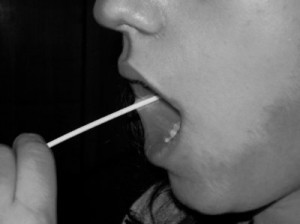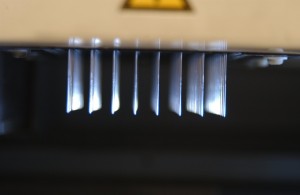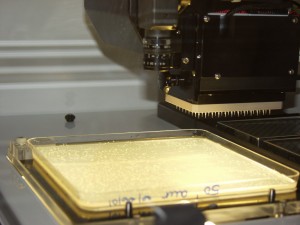What is a paternity test?
A DNA comparison test to remove the doubt on a paternal relation.
A DNA paternity test serves to confirm that the alleged father is the biological father of the child. There is no need to test the mother. We inherit our genetic structure from our two biological parents. One half from our mother and one half from our father. A paternity test compares the DNA profile of a child with that of the alleged father. It will reveal whether the child has received some of the DNA structure from the alleged father or not.
What’s needed for a paternity test?
A basic paternity test requires at least the participation of the child and the alleged father. It is possible to involve more people in a paternity test, including the mother of the child or another child. It is possible to test DNA samples from another alleged father simultaneously. The additional extra cost per person tested depends on the type of test.
To let the mother of the child participate in the test will improve the results. The laboratory can isolate the DNA-structure received from the mother and therefore put complete focus on the father’s DNA structure. This will results in a slightly higher calculated probability of paternity. In many laboratories, the inclusion of a maternal DNA-sample is included in the price. If the mother can’t or won’t participate in the test, you will still obtain a probability of paternity of up to 99,9% (with the mother, the result could be greater than 99.99%).
How long before I receive the paternity test results?
The results of a DNA paternity test are treated confidentially. They are sent by email or traditional mail to the person who ordered the test. The results of a paternity test are available in 3-4 business days from receipt of the DNA-samples by the laboratory (mouth swab).
Many laboratories offer express processing of DNA analysis, with the results then available in 2-3 days. Beware, we found that pricing can go up considerably: from $100 to $200!
Are home paternity tests accurate?
The sent analysis report clearly indicates what the probability is that the alleged father of the child is his biological father:
The alleged father then has 99.99% chance of being the biological father of the child.
The probability of paternity is 0%: The alleged father has no chance of being the biological father of the child.
How to do a paternity test?
DNA tests are done on a sample of saliva and cells from the inside of your cheek, a so-called buccal swab. The swabs used (sticks with a cotton bud) are specifically designed to be introduced into the mouth. They are very similar to cotton stems found in our bathrooms, with a somewhat longer rod and they are often composed of synthetic fibers instead of cotton to collect a greater quantity of DNA.
The DNA collection kit with the mouth swabs is mailed in a discreet envelope. This collection kit contains sterile equipment and instructions on the preferred sample recovery method. The procedure is simple and fast (within 10 minutes) and after drying he swabs for an hour, you can send them by mail to the lab.
The DNA molecules are the same for each cell in our body. The results of a DNA test are the same regardless of the sample collection method: blood sampling, mouth, hair, or any other non-standard samples. The buccal sample is a non-intrusive and painless method, which quickly collect a large amount of DNA. This is why it has quickly become the most common method of sampling. You can remove the cells with infants, young children, adults or the elderly within the comfort of your home.
If the oral sampling is not possible (not available or missing father).
Non-standard DNA-samples: If one of the two people (father or child) can not provide any of these samples, there is he possibility to extract DNA from almost anything: hair, dry blood, nails, cigarette, etc… The DNA molecules do not degrade as quickly as one might think. It is possible to extract DNA from these materials even when samples date back many years. Having said that, the odds to recover enough DNA vary depending on the medium and the sample age and (of course) there is an extra charge.
Grandparents: Grandparents can participate in the test when the alleged father is deceased and you don’t have any other DNA sample. The results will be as accurate as if the father had himself participated in the test.
Boy looking for father: If a boy is looking for his father, another member of the paternal bloodline such as an uncle (brother of your father) or nephew (brother of the father of your child) or paternal grandfather could participate in the test. In this case we recommend testing the Y chromosome, which provides an accuracy of 100% for this group of participants.
Girl looking for father: For a girl looking for her father, she could take the test of the X chromosome with her sister, or with another member of the paternal line, such as a grandmother, uncle or a cousin (brother of the child your father). The results have an accuracy of 100% for this group of participants.
Finally, in other cases, a brotherhood test can be performed with a brother or sister and an avuncular test can be done with an uncle or aunt.
Can I do a paternity test without a participant’s consent?
Most laboratories perform the paternity tests only after receipt of the samples of your payment and a completed consent form signed by each participant in the test. For a minor child, you will have to provide the laboratory with the consent of a parent or legal representative.
In the particular case where the father is deceased, most companies agree that his direct heirs give their consent to a test from a discrete sample (tissue, hair, etc.).
Is a home paternity test is admissible in court?
No, it is not. If you wish to use the result of a DNA paternity test as part of a legal procedure, we invite you to take advice from a lawyer. The sampling procedures are different (self home collection is not admissible, it must be able to prove the identity of those tested) per country and region and the collection of consent procedures may also vary from jurisdiction to jurisdiction. You must ensure that you have the right to conduct a paternity test in accordance with the laws applicable in the country where you are.
Are paternity testing laboratories reliable?
When the tested father is actually the biological father of the child, DNA testing can confirm paternity with a minimum probability of 99.99%.
The test provides an accuracy of 100% for paternity exclusion: when the father tested is not the biological father of the child, the result of the DNA test will establish the child has no chance of being derived from alleged father.
The results of a DNA test are reliable when the test is performed by an accredited laboratory, respecting careful procedures. They then provide irrefutable proof of a biological relationship, or lack thereof. Beware of websites that offer inexpensive tests! They may be conducted on a smaller number of DNA areas (loci) or by non-accredited laboratories to less stringent procedures. Visit our black list of laboratories to avoid, before ordering a paternity test.
The sample processing procedures and laboratory equipment must be submitted to the regulatory tests and earned accreditation according to international standards ISO17025 and AABB. The best laboratories are conducting each test twice, by different teams, which then cross their results to eliminate all source of error. This is why they request the collection of two samples per participant.
Tips and advice from PaternityTestinglabs.com:
- What test DNA choose? A summary of the accuracy and possible DNA testing based on the participants’ relationship.
- 7 tips for a successful test DNA. Too much information on this page? Summarize the important point for me to choose my test!
- Compare our prices! The pricing of DNA testing by test type, with trusted laboratories.
- Don’t get scammed! See our blacklist of paternity testing laboratories to avoid!
How to order a paternity test?
We hope you have found the answers to all your questions about DNA paternity testing. If you want to order a paternity test, you can pick one of the many laboratories that currently offer to perform DNA testing at home. Make sure the one you choose is an accredited laboratory. For our part, we tested the following laboratories and specifically recommend for the quality of service in relation to the price and the quality of their customer service.

